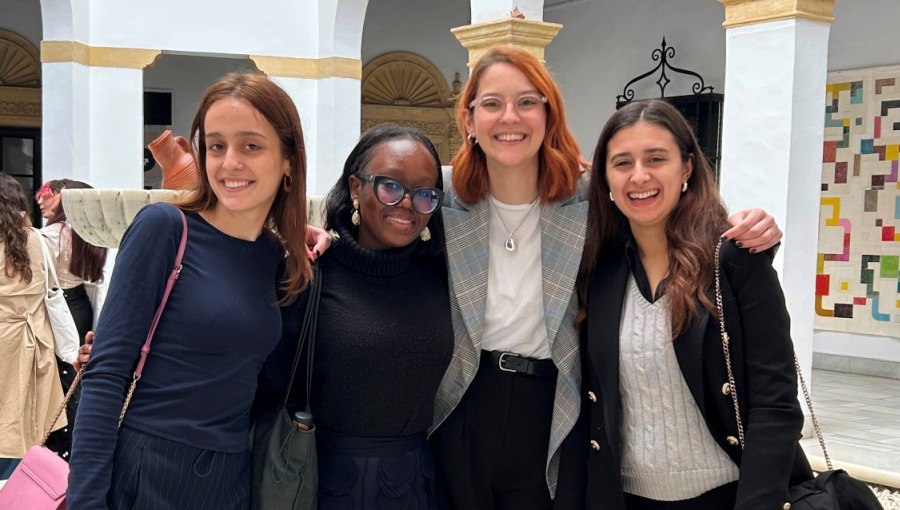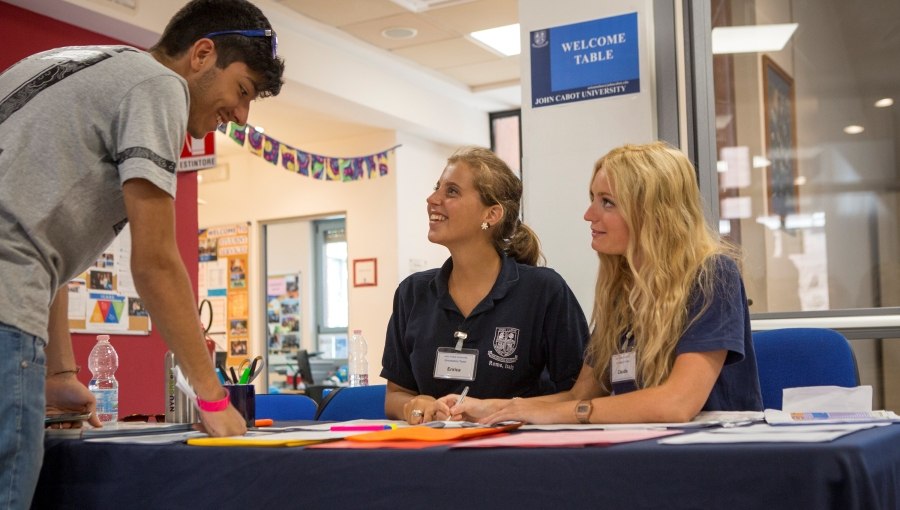Health and Wellbeing at JCU: Meet Director Roman Clark
Originally from Wales, U.K., Roman Clark is JCU’s Director of Health and Wellbeing and Minors’ Program Manager. He’s worked in various fields, from public relations to literary translations.

Roman Clark
Tell us about your background.
I studied in Bath, England. After obtaining my master’s degree, I moved to Italy for a job in special education for several years. Then I decided to retrain and got a Master’s in Marketing Communications. My plan was to move into public relations or event planning, so I froze my contract in Rome and I went to China for a work placement. I understand what students go through when they talk about culture shock. I learned more about life and about my goals from that experience. I came back to Rome and began work in event planning, but I realized I missed the contact with students. That’s how I came to JCU, initially to work on a one semester contract with a program from a visiting school. After that role ended there was a full-time opportunity, and I’ve been here ever since.
What does your role entail and what are your main responsibilities?
The Health and Wellbeing Office oversees JCU’s internal resources and connects students to external resources. We have our team of doctors, counselors, and psychiatrists, who assist students. We also help those who need specialist appointments at the hospital or provide them with additional resources in Rome.
For the Minors Program, an assigned guardian is required to attend JCU. I am appointed to underage students who live on campus. A 17-year-old might need a bit more input when it comes to their wellbeing. We plan activities and events specifically for the minors and we try to provide guidance until they become legal adults.
What made you pursue a career in higher education?
I like the contact with young people. Earlier in my career I worked with younger children and there are plenty of good moments, but over time it took a toll on me because I needed to interact with students who are on the cusp of adulthood. You can engage with them differently. This role in higher education draws on my medical interpreting qualifications. It pulls together different threads: from my experience in event planning, to medical and linguistic interpreting within a younger community.
What student services are available through the Health & Wellbeing Office?
We have campus doctors, counselors, and psychiatrists available to students free of charge. Our head counselor oversees a team of six counselors and two psychiatrists. They’re English speaking, and on campus, so students don’t need to find anything independently. Students can write to the office for counseling. We also connect students to external therapists as well. In Rome, there’s a network of English and Italian speaking psychologists, who are covered by the insurance plan CISI, which is specific to the JCU community. It offers things that we believe our community members need. In addition, we have our doctor on call. Students might be too sick to come to campus or maybe the hours don’t work for them. The idea is to make the experience as easy as possible for students to achieve their academic goals.
What new services and activities has the Health and Wellbeing Office put together this semester?
Over the last two years, there has been a pause in some of the services that we offer. Some things we’re offering again include the seasonal flu vaccine. We plan to continue offering health screenings. This semester, we’d like to create a link with a hospital where more in-depth testing can be performed. We plan on focusing on preventative screenings. Some screenings that we are looking to add include an osteopath or a chiropractor, especially around exam season. If students feel their posture’s poor, this could be something that will help them improve it as well as their overall wellbeing. A dermatologist is one of the other things that we are looking into.
Where do you see the JCU community in 10 years?
10 years is enough for planning and setting aside resources to have a larger medical center. We have individual resources, counseling, and campus doctors, but it would be nice to have one centralized physical space.
One of the challenges as the University grows is to maintain our resource development, and where to place them. It’s positive to have all this growth, so the challenge for us is to make sure that once students arrive, we keep our end of the bargain to offer everyone the same quality. Having staff members who also work in external facilities is a huge benefit to us, and we’d like to continue investing in it.
What advice would you give to students who are experiencing culture shock for the first time ever moving here? What resources are available to them?
During orientation, the counselors have a workshop with students where they touch on culture shock. Hopefully, students are aware when they come here that they’re not the first to experience this or that it’s not something to be ashamed of. They should begin to create this link between mental health resources available for whatever their needs are. It’s important to acknowledge culture shock first and not feel ashamed, and then seek help. But if they feel that a student’s needs are affecting their academic performance or other areas of life, they can involve me and the Dean of Academics. We work together to make sure students are supported across the board. Success isn’t necessarily top grades, but also the best experience possible.
You’re a freelance writer and translator. Why did you pursue this profession? What makes a good translator in your opinion?
My first master’s was in translation and interpreting. Those are freelance projects that I kept going over time, even while I moved around, working in events and different things. The best translators are the ones who step back from the source material and are willing to accept feedback from people even when they don’t want to hear it. Be a brave translator, one who’s willing to change word order and really work with the text. My real passion though was medical interpreting. It’s different from writing, it lacks poetic scope, but you gain real personal interaction. It’s challenging, but it also gives satisfaction in a way that translation doesn’t.
Any final thoughts?
If you don’t have any goals, you’re never going to grow and you’re not going to progress.





